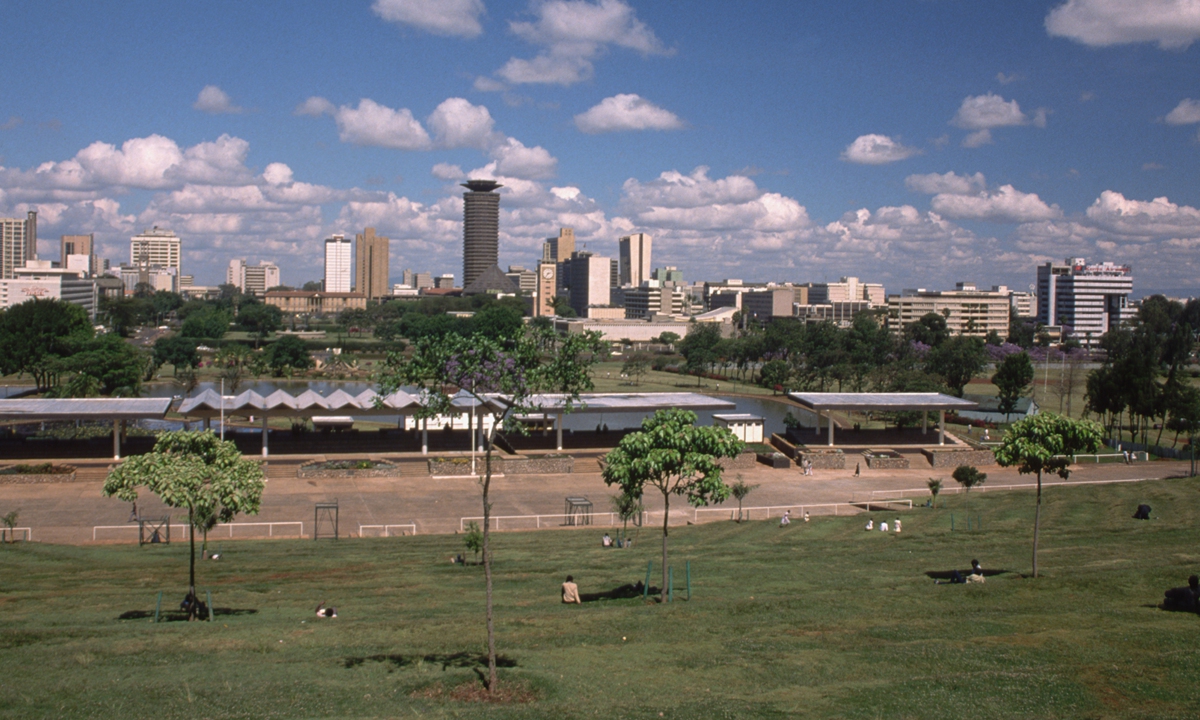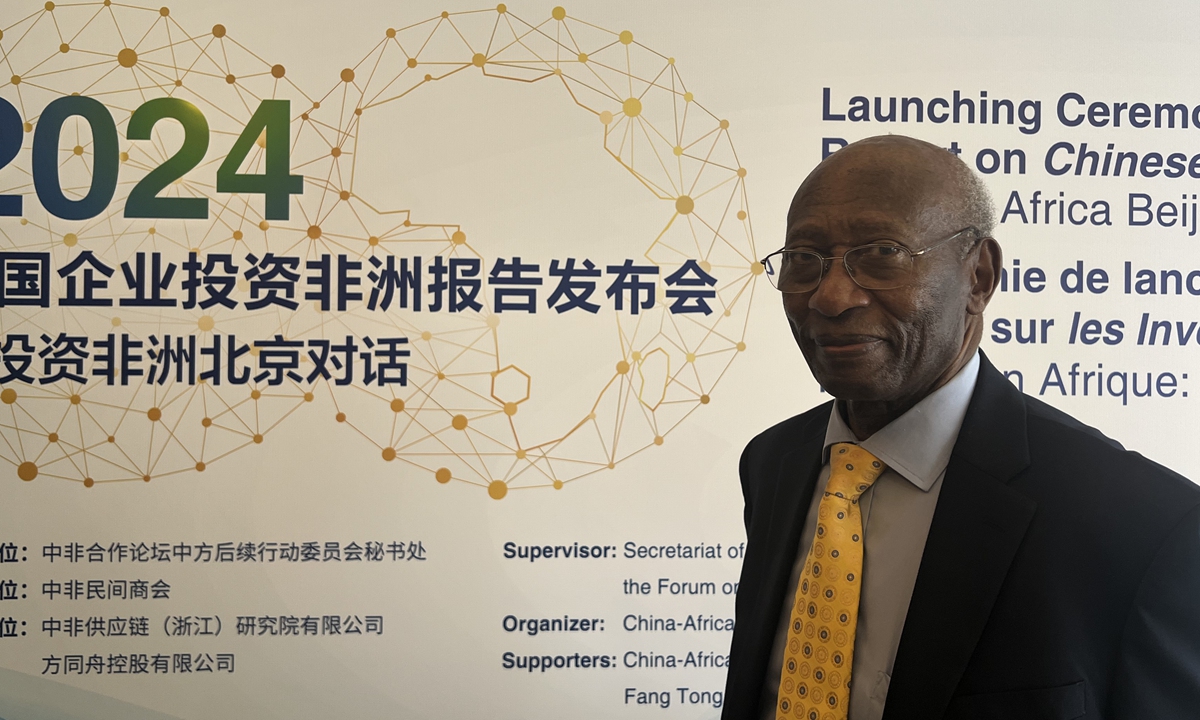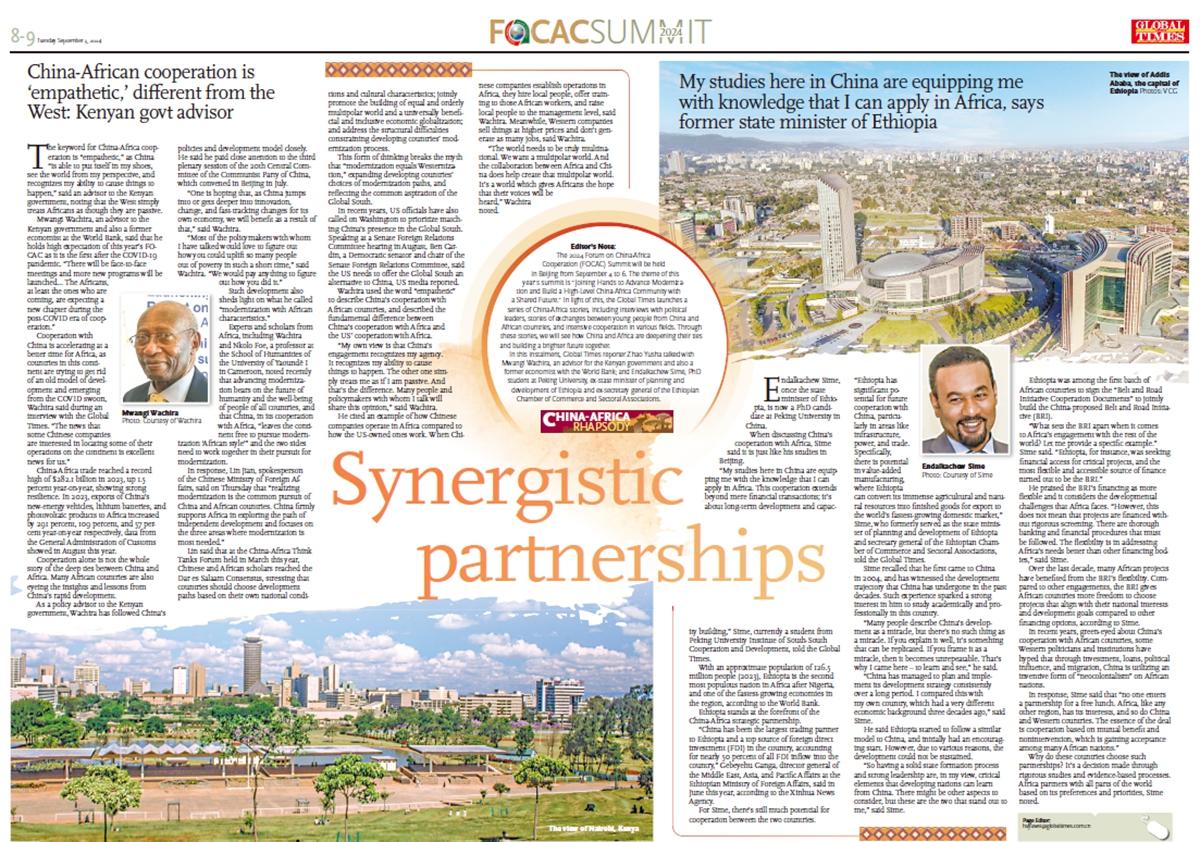IN-DEPTH / DIPLOMATIC CHANNEL
China-African cooperation is ‘empathetic,’ different from the West: Kenyan govt advisor
Editor's Note:
The 2024 Forum on China-Africa Cooperation (FOCAC) Summit will be held in Beijing from September 4 to 6. The theme of this year's summit is "Joining Hands to Advance Modernization and Build a High-Level China-Africa Community with a Shared Future." In light of this, the Global Times launches a series of China-Africa stories, including interviews with political leaders, stories of exchanges between young people from China and African countries, and intensive cooperation in various fields. Through these stories, we will see how China and Africa are deepening their ties and building a brighter future together.
In this instalment, Global Times reporter Zhao Yusha talked with Mwangi Wachira, an advisor for the Kenyan government and also a former economist with the World Bank.

The keyword for China-Africa cooperation is "empathetic," as China "is able to put itself in my shoes, see the world from my perspective, and recognizes my ability to cause things to happen," said an advisor to the Kenyan government, noting that the West simply treats Africans as though they are passive.
Mwangi Wachira, an advisor to the Kenyan government and also a former economist at the World Bank, said that he holds high expectation of this year's FOCAC as it is the first after the COVID-19 pandemic. "There will be face-to-face meetings and more new programs will be launched… The Africans, at least the ones who are coming, are expecting a new chapter during the post-COVID era of cooperation."
Cooperation with China is accelerating at a better time for Africa, as countries in this continent are trying to get rid of an old model of development and emerging from the COVID swoon, Wachira said during an interview with the Global Times. "The news that some Chinese companies are interested in locating some of their operations on the continent is excellent news for us."
China-Africa trade reached a record high of $282.1 billion in 2023, up 1.5 percent year-on-year, showing strong resilience. In 2023, exports of China's new-energy vehicles, lithium batteries, and photovoltaic products to Africa increased by 291 percent, 109 percent, and 57 percent year-on-year respectively, data from the General Administration of Customs showed in August this year.

Cooperation alone is not the whole story of the deep ties between China and Africa. Many African countries are also eyeing the insights and lessons from China's rapid development.
As a policy advisor to the Kenyan government, Wachira has followed China's policies and development model closely. He said he paid close attention to the third plenary session of the 20th Central Committee of the Communist Party of China, which convened in Beijing in July.
"One is hoping that, as China jumps into or gets deeper into innovation, change, and fast-tracking changes for its own economy, we will benefit as a result of that," said Wachira.
"Most of the policymakers with whom I have talked would love to figure out how you could uplift so many people out of poverty in such a short time," said Wachira. "We would pay anything to figure out how you did it."
Such development also sheds light on what he called "modernization with African characteristics."
Experts and scholars from Africa, including Wachira and Nkolo Foe, a professor at the School of Humanities of the University of Yaoundé I in Cameroon, noted recently that advancing modernization bears on the future of humanity and the well-being of people of all countries, and that China, in its cooperation with Africa, "leaves the continent free to pursue modernization 'African style'" and the two sides need to work together in their pursuit for modernization.
In response, Lin Jian, spokesperson of the Chinese Ministry of Foreign Affairs, said on Thursday that "realizing modernization is the common pursuit of China and African countries. China firmly supports Africa in exploring the path of independent development and focuses on the three areas where modernization is most needed."
Lin said that at the China-Africa Think Tanks Forum held in March this year, Chinese and African scholars reached the Dar es Salaam Consensus, stressing that countries should choose development paths based on their own national conditions and cultural characteristics; jointly promote the building of equal and orderly multipolar world and a universally beneficial and inclusive economic globalization; and address the structural difficulties constraining developing countries' modernization process.
This form of thinking breaks the myth that "modernization equals Westernization," expanding developing countries' choices of modernization paths, and reflecting the common aspiration of the Global South.
In recent years, US officials have also called on Washington to prioritize matching China's presence in the Global South. Speaking at a Senate Foreign Relations Committee hearing in August, Ben Cardin, a Democratic senator and chair of the Senate Foreign Relations Committee, said the US needs to offer the Global South an alternative to China, US media reported.
Wachira used the word "empathetic" to describe China's cooperation with African countries, and described the fundamental difference between China's cooperation with Africa and the US' cooperation with Africa.
"My own view is that China's engagement recognizes my agency. It recognizes my ability to cause things to happen. The other one simply treats me as if I am passive. And that's the difference. Many people and policymakers with whom I talk will share this opinion," said Wachira.
He cited an example of how Chinese companies operate in Africa compared to how the US-owned ones work. When Chinese companies establish operations in Africa, they hire local people, offer training to those African workers, and raise local people to the management level, said Wachira. Meanwhile, Western companies sell things at higher prices and don't generate as many jobs, said Wachira.
"The world needs to be truly multinational. We want a multipolar world. And the collaboration between Africa and China does help create that multipolar world. It's a world which gives Africans the hope that their voices will be heard," Wachira noted.

The 2024 Forum on China-Africa Cooperation (FOCAC) Summit will be held in Beijing from September 4 to 6. The theme of this year's summit is "Joining Hands to Advance Modernization and Build a High-Level China-Africa Community with a Shared Future." In light of this, the Global Times launches a series of China-Africa stories, including interviews with political leaders, stories of exchanges between young people from China and African countries, and intensive cooperation in various fields. Through these stories, we will see how China and Africa are deepening their ties and building a brighter future together.
In this instalment, Global Times reporter Zhao Yusha talked with Mwangi Wachira, an advisor for the Kenyan government and also a former economist with the World Bank.

The view of Nairobi, Kenya
The keyword for China-Africa cooperation is "empathetic," as China "is able to put itself in my shoes, see the world from my perspective, and recognizes my ability to cause things to happen," said an advisor to the Kenyan government, noting that the West simply treats Africans as though they are passive.
Mwangi Wachira, an advisor to the Kenyan government and also a former economist at the World Bank, said that he holds high expectation of this year's FOCAC as it is the first after the COVID-19 pandemic. "There will be face-to-face meetings and more new programs will be launched… The Africans, at least the ones who are coming, are expecting a new chapter during the post-COVID era of cooperation."
Cooperation with China is accelerating at a better time for Africa, as countries in this continent are trying to get rid of an old model of development and emerging from the COVID swoon, Wachira said during an interview with the Global Times. "The news that some Chinese companies are interested in locating some of their operations on the continent is excellent news for us."
China-Africa trade reached a record high of $282.1 billion in 2023, up 1.5 percent year-on-year, showing strong resilience. In 2023, exports of China's new-energy vehicles, lithium batteries, and photovoltaic products to Africa increased by 291 percent, 109 percent, and 57 percent year-on-year respectively, data from the General Administration of Customs showed in August this year.

Mwangi Wachira Photo: Courtesy of Wachira
Cooperation alone is not the whole story of the deep ties between China and Africa. Many African countries are also eyeing the insights and lessons from China's rapid development.
As a policy advisor to the Kenyan government, Wachira has followed China's policies and development model closely. He said he paid close attention to the third plenary session of the 20th Central Committee of the Communist Party of China, which convened in Beijing in July.
"One is hoping that, as China jumps into or gets deeper into innovation, change, and fast-tracking changes for its own economy, we will benefit as a result of that," said Wachira.
"Most of the policymakers with whom I have talked would love to figure out how you could uplift so many people out of poverty in such a short time," said Wachira. "We would pay anything to figure out how you did it."
Such development also sheds light on what he called "modernization with African characteristics."
Experts and scholars from Africa, including Wachira and Nkolo Foe, a professor at the School of Humanities of the University of Yaoundé I in Cameroon, noted recently that advancing modernization bears on the future of humanity and the well-being of people of all countries, and that China, in its cooperation with Africa, "leaves the continent free to pursue modernization 'African style'" and the two sides need to work together in their pursuit for modernization.
In response, Lin Jian, spokesperson of the Chinese Ministry of Foreign Affairs, said on Thursday that "realizing modernization is the common pursuit of China and African countries. China firmly supports Africa in exploring the path of independent development and focuses on the three areas where modernization is most needed."
Lin said that at the China-Africa Think Tanks Forum held in March this year, Chinese and African scholars reached the Dar es Salaam Consensus, stressing that countries should choose development paths based on their own national conditions and cultural characteristics; jointly promote the building of equal and orderly multipolar world and a universally beneficial and inclusive economic globalization; and address the structural difficulties constraining developing countries' modernization process.
This form of thinking breaks the myth that "modernization equals Westernization," expanding developing countries' choices of modernization paths, and reflecting the common aspiration of the Global South.
In recent years, US officials have also called on Washington to prioritize matching China's presence in the Global South. Speaking at a Senate Foreign Relations Committee hearing in August, Ben Cardin, a Democratic senator and chair of the Senate Foreign Relations Committee, said the US needs to offer the Global South an alternative to China, US media reported.
Wachira used the word "empathetic" to describe China's cooperation with African countries, and described the fundamental difference between China's cooperation with Africa and the US' cooperation with Africa.
"My own view is that China's engagement recognizes my agency. It recognizes my ability to cause things to happen. The other one simply treats me as if I am passive. And that's the difference. Many people and policymakers with whom I talk will share this opinion," said Wachira.
He cited an example of how Chinese companies operate in Africa compared to how the US-owned ones work. When Chinese companies establish operations in Africa, they hire local people, offer training to those African workers, and raise local people to the management level, said Wachira. Meanwhile, Western companies sell things at higher prices and don't generate as many jobs, said Wachira.
"The world needs to be truly multinational. We want a multipolar world. And the collaboration between Africa and China does help create that multipolar world. It's a world which gives Africans the hope that their voices will be heard," Wachira noted.



